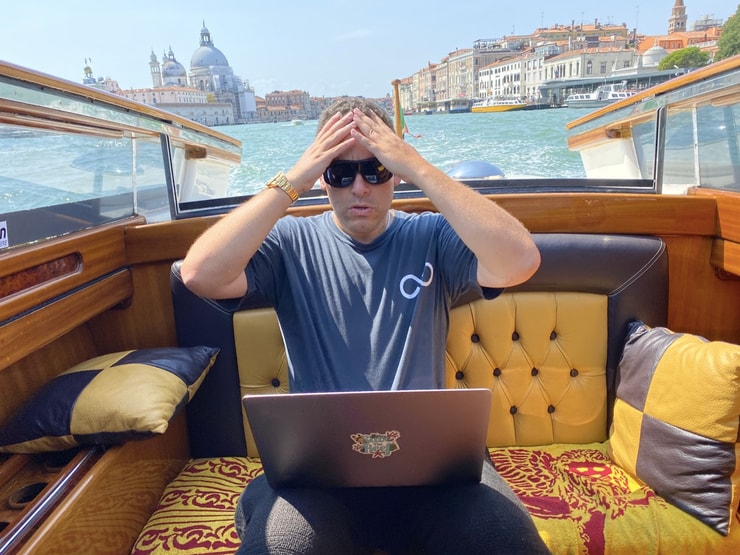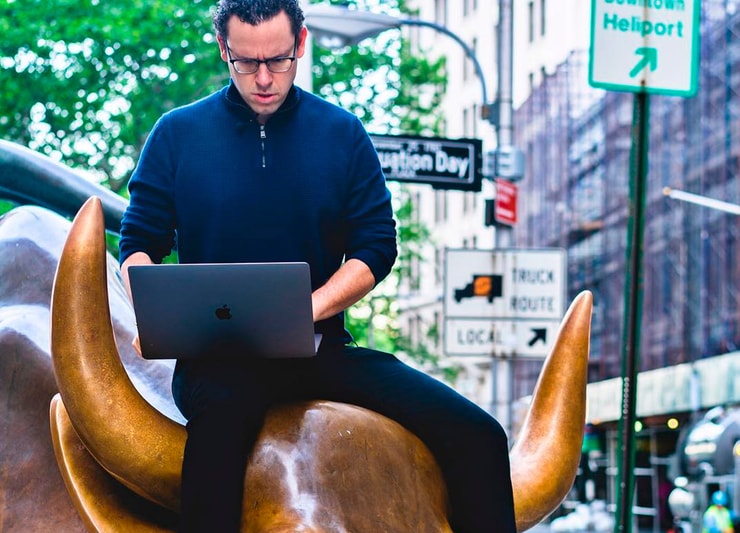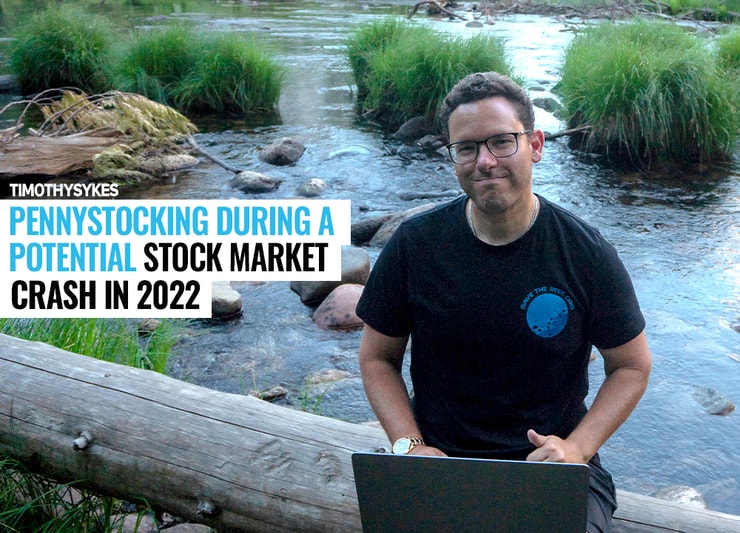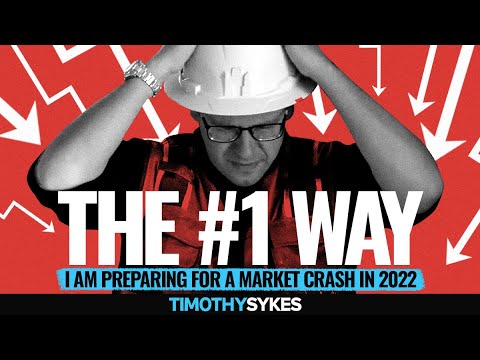Stock Market Crash 2022: Key Takeaways
- Will hyperinflation create a stock market crash in 2022?
- How I survived the dot-com crash and how I’ll approach the next one…
- My tips and strategies to help you survive and prepare NOW.
Learn To Trade Through ANY Kind Of Market — Start Here
Will the stock market crash in 2022? I can’t predict the future. But I’ve seen hot markets like this before and I know how they end. If you’ve never traded through a market crash, it’s time to study up! Learn from past market crashes and how to prepare for the next one with these strategies.
History repeats itself, every bubble promoters make people believe following others is the key to success, but it always leads to failure, read https://t.co/QTYT7tytOA & study https://t.co/KhqHFIe64c & https://t.co/46W8tDSDIj to see how it ends. Study up & become self-sufficient!
— Timothy Sykes (@timothysykes) December 7, 2021
Table of Contents
Stock Market Crash 2022: Is This the Year?

This market looks like a bubble — it’s frothy. It’s full of speculation, dumb money, greed, and hype.
SO many markets are overextended — the stock market, real estate, oil. Bitcoin even made new all-time highs before the recent cryptocurrency crash.
I don’t think it can last…
The 2021 inflation rate is growing at the fastest rate in nearly 40 years. The economy and small businesses are struggling.
The Fed’s money-printing is propping up the market. But that’s due to end in mid-2022.
To me, a market crash isn’t a question of if but when…
It could crash in 2022 or 2023, or it could crash tomorrow. I don’t know. It’s not about predicting the market. I want you to prepare and react.
What Causes a Stock Market Crash?

Market bubbles almost always lead to stock market crashes. Why?
When investors take profits, they need buyers to sell to. If there are no buyers at high prices, prices go down. That creates a slippery slope…
Declining prices can trigger mass panic. And brokers can add to selling pressure by issuing margin calls and liquidating large positions. (I’ll give you an example later.)
Markets can also crash due to black swan events that spook investors — like the March 2020 crash.
Nobody can predict what will trigger a market crash or when it will happen. But I like to prepare. That’s why I’m looking for any signs of topping.
Three out of four stocks follow the markets. And I’ve seen the effects market crashes have on penny stocks before…
Lessons From Stock Market Crashes in History

Study the past! It doesn’t repeat, but it often rhymes…
My First Stock Market Bubble and the Dot-Com Crash
The current market bubble has grown on hype and speculation about new technology — EVs, solar, NFTs, the metaverse.
It reminds me of the dot-com bubble in the late 90s and early 2000.
Speculation, greed, and hype ran rampant. The market was abuzz about internet technology. A company’s announcement of a new website could send a stock soaring.
That’s when I made my first million trading my OTC gap-up strategy.
But the hype faded. The tech bubble burst in March 2000 and the markets tanked. Many small companies didn’t survive.
Worst of all, my patterns and strategies stopped working. I had to adapt. I tried different strategies for months without success. And I lost roughly $10,000.
Then I found a strategy that would make me my second million in profits. More on that later…
Read how I traded through the dot-com bubble and crash in my NO-COST book, “An American Hedge Fund.”
Here’s another example of a bubble ending badly…
The Housing Bubble

Leading up to 2008, subprime mortgages made it easy for borrowers with lower credit scores to get funding for homeownership. That increased demand and home prices skyrocketed.
The housing bubble burst in 2006 when prices peaked and supply outweighed demand.
By 2008, many homeowners owed more than their homes were worth. And the high number of mortgage defaults brought down some of the biggest banks and investment firms in the U.S.
That triggered a stock market crash and the start of the Great Recession.
It was a great market for short-sellers. Read how Michael Burry made $100 million shorting the housing bubble in the book, “The Big Short” by Michael Lewis.
(As an Amazon Associate, we earn from qualifying purchases.)
1929 Crash
The 1929 crash is one of the biggest stock market crashes in history.
The Roaring 20s were a decade of massive industrial and economic growth in America. Consumer confidence and optimism led to increased market speculation. And many used margin to fund their investments.
But when production created an oversupply of products, stock prices weakened. Banks issued margin calls and sold investors’ positions. The stock market crashed and the decline lasted three years. The following Great Depression lasted 10 years.
What do these three market crashes have in common?
Hype and exuberance — that eventually fade. And when supply outweighs demand, assets crash. But it doesn’t mean there aren’t trading opportunities…
Stock Market Crash 2022: How to Survive
Surviving a stock market crash comes down to your ability to adapt. Here are my top tips…
1. Experiment With New Strategies
A stock market crash impacts traders’ mindsets, emotions, and approaches to the market. Expect patterns to change.
Take time to adapt to the new market environment. Keep an open mind and test different strategies.
When the dot-com bubble burst, I tried different strategies for eight months. Nothing worked. Then I discovered short selling…
More Breaking News
- Pagaya Technologies Sees Stock Fluctuations Amid Strategic Moves
- HIMS Stops Compounded Pill Amid Legal Threats
- Strategic Acquisition Expands Momentus Inc.’s Horizons
- AppLovin’s Stock Jumps Amid Optimistic Analyst Upgrades
2. Short Selling a Stock Market Crash in 2022
I haven't shorted ANYTHING in 2 years now as it's been very risky/stressful to be a short seller in this $DIA $SPY $QQQ $BTC $ETH bubble & as someone who prioritizes students over profits, I want to set a good example too…but I'll likely short some in 2022 as this bubble pops!
— Timothy Sykes (@timothysykes) December 7, 2021
I haven’t shorted anything for two years. But if any of these overextended markets and sectors are going to crash — I want to be ready. I adapted after the dot-com bubble burst, and I’ll do it again if we see a stock market crash in 2022.
That’s why I just opened a new brokerage account with TradeZero. I’m ready to test their borrows. And I’m using my TradeZero account to start a new small-account challenge. Sign up here to follow my progress and get a special offer.
But know that short selling is risky for new traders. There’s the potential for infinite losses. And short squeezes are some of the most powerful moves in the entire market. Stocks can always go higher than you think.
Be prepared to cut losses quickly on any trade.
How to Prepare Your Stock Market Crash Survival Guide

Market crashes can be extremely volatile. Prepare for it now with the right rules and discipline.
I developed my trading rules to keep me safe in any kind of market. If the stock market crashes in 2022, I won’t care. I’ll continue to:
- Cut losses quickly.
- Sell into strength.
- Swing for singles.
- Trade like a retired trader.
I’ll only come out of retirement for my best setups. Otherwise, I’ll sit on my hands. Cash is a position. And sometimes the best trade is no trade.
You can’t control the markets, but you can control your preparation and education.
Trading Challenge

Having a trading education is imperative if you want to survive a stock market crash.
I’ve traded through bull markets and bear markets. And I’ve survived many stock market crashes. But many traders don’t…
They fail to adapt. And they stop learning.
Your trading education’s a journey. That’s why I make weekly video lessons and do live webinars for Trading Challenge students. The market constantly changes, and you have to change with it.
Learn from my 20+ years of trading experience — apply for my Trading Challenge today!
What do you think? Will the stock market crash in 2022? Let me know in a comment below…




Leave a reply